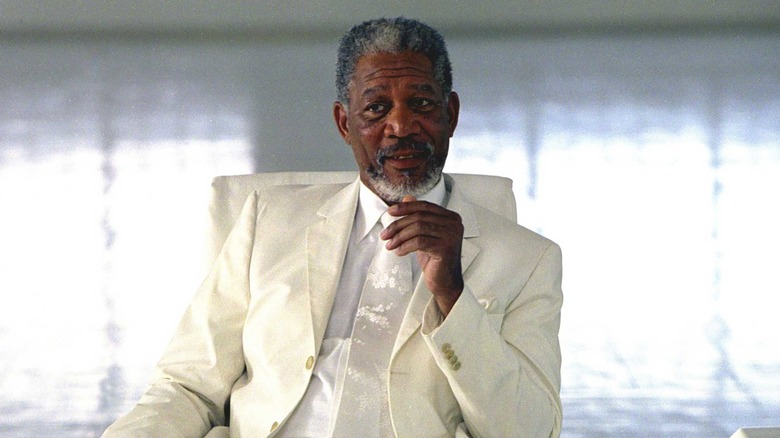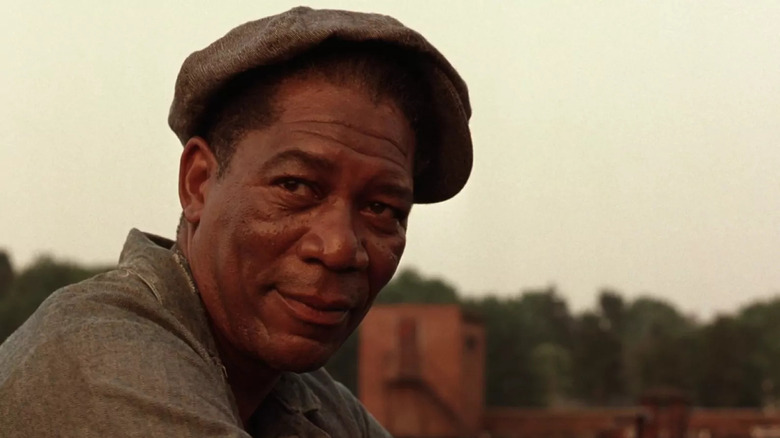Morgan Freeman's Famous Voice Didn't Happen By Accident
When the title character in Tom Shadyac's 2003 comedy film "Bruce Almighty" has a terrible few days, he complains to God that He might not being doing His job properly. In response, God (Morgan Freeman) appears to Bruce (Jim Carrey) and offers him the divine gig for a few days as a way to teach him some humility. (Worry not, Bruce does not cause any major cataclysms). The film is a lighthearted, gently thoughtful comedy romp that proved to be an enormous hit.
The casting of Freeman in the role of God was logical. Thanks to his calming, authoritative screen presence and stentorian, orotund voice, Freeman already had — in the minds of many — a Heavenly Father-like appeal that he brought to many of his roles. Freeman's voice, especially, has been employed by many filmmakers to great effect, capable of communicating the gentle hope singing out from Shawshank prison in "The Shawshank Redemption," or explaining the miracle of penguins in "March of the Penguins." Freeman has narrated over a dozen documentary films, walking audiences through topics as diverse as the cosmos ("Cosmic Voyage"), slavery ("Slavery and the Making of America"), and the prom ("Prom Night in Mississippi"). If pressed, most ordinary people have said they would like Freeman to narrate their everyday lives, so smooth is his chiffon voice.
Freeman, perhaps surprisingly, revealed in a 2007 interview on "Late Night with Conan O'Brien" that his euphonic voice was not something he possessed naturally. As he discusses, Freeman developed his voice carefully, and with a lot of practice, alongside an acting coach.
Someone helps you get it
O'Brien, as anyone might be, is effusive in talking to Freeman, pointing out that he has the best voice of any actor working, describing it as mellifluous. Surely that voice arose in Freeman sometime during puberty and armed him with the authority that would make him a movie star. O'Brien asked Freeman about his "gift," and Freeman — not out of humility — rejected O'Brien's praise. His voice, he corrected, was the result of a special effort. He said that it was "not a natural gift at all. I don't think that any voice is a natural gift, someone helps you get it."
O'Brien's next question was logical: What did Morgan Freeman sound like before he sounded like Morgan Freeman? What was his voice like? Freeman answered:
"It was high. I had a very thick Southern accent. I was raised in Mississippi ... When I studied Acting 101 at LACC, you know, Los Angeles City College ... it turned out that I had a very fine acting, not acting, but voice coach, voice instructor. He gave us voice and diction, and voice development. And voice development is where he started working you down in your register. He says everybody, most people talk a bit higher than their normal."
Freeman had been interested in acting since he was 12, and moved to Los Angeles in 1959 after a stint with the military. There, he continued to study acting at the famous Pasadena Playhouse and, yes, at LACC. After decades of performing, Freeman would break out in 1987 with the film "Street Smart," which earned him his first Oscar nomination. The 1989 prestige hits "Glory" and "Driving Miss Daisy" assured Freeman a place in the Hollywood firmament.
He has been a minor deity ever since.

